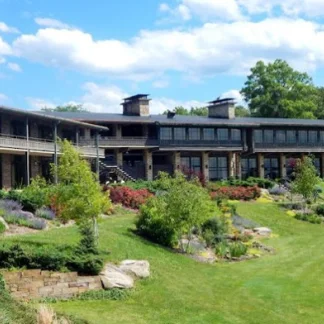Vertava Health Ohio
Sherrodsville, Ohio, 2650 Lodge Road SW, 44675
Available Programs
- Adult program
- Elderly program
- Postpartum program
- Program for men
- Program for women
- Young adult program
Insurance and Financial
- Self-pay options
- Private insurance
- Sliding scale payment assistance
About this Facility
Vertava Health Ohio–The Bluffs is a comprehensive drug and alcohol rehab for adults in Sherrodsville, Ohio, specializing in dual diagnosis care, medically supervised detox, and inpatient, outpatient, and aftercare services. Dedicated programs for pregnant and postpartum women, seniors, and young adults are available. Their primary treatment modalities combine addiction counseling with evidence based complementary therapies and recovery focused life skills training.
Vertava Health Ohio–The Bluffs, in Sherrodsville, is an integrative addiction recovery center for adults featuring luxury amenities and lakeside views. They specialize in dual diagnosis care, medically supervised detox, and inpatient, outpatient, and aftercare services. They also offer dedicated programs for pregnant and postpartum women, seniors, and young adults. Their primary treatment modalities include individual, group, and family counseling. Life skills training and complementary therapies are also prioritized.
The experienced clinicians at The Bluffs are licensed to provide round-the-clock medical supervision for clients in detox and to prescribe FDA approved medications to ease withdrawal symptoms and prevent complications.
The Bluffs’ inpatient program enables clients to focus on their recovery in a safe, private, and luxurious environment with premium amenities, including lakeside views, hiking trails, onsite fitness and recreational facilities, a swimming pool, and a gym. While in residence, clients participate in multiple therapy sessions daily, with counseling practices drawn from CBT, DBT, and motivational interviewing approaches. They may also engage in an array of proven holistic treatments, including fitness and recreational therapy. Their program also emphasizes addiction education and recovery focused life skills training to support long term health and sobriety.
The Bluffs’ outpatient programs are designed to evolve with clients’ changing needs and encompass multiple levels of care, including intensive outpatient (IOP), sober living, and traditional outpatient programming. While in outpatient care, clients continue to receive robust therapeutic support and continuing recovery focused education.
The Bluffs’ suite of aftercare services promotes sustained sobriety as the client reintegrates into their community, work, home, and family life. Depending on the client’s individual needs, services may include career counseling, peer coaching, mental health and social services referrals, and transitional support as clients enter community based 12 step and 12 step alternative programs.
Vertava Health Ohio–The Bluffs is state licensed and accredited by the Joint Commission. They accept self pay and private insurance. Need based sliding scale payment plans are available.
Contact us for more information: (740) 200-3800

Contact Vertava Health Ohio
Connect with Vertava Health Ohio by calling their admissions team directly.
(740) 200-3800 Website Get Directions